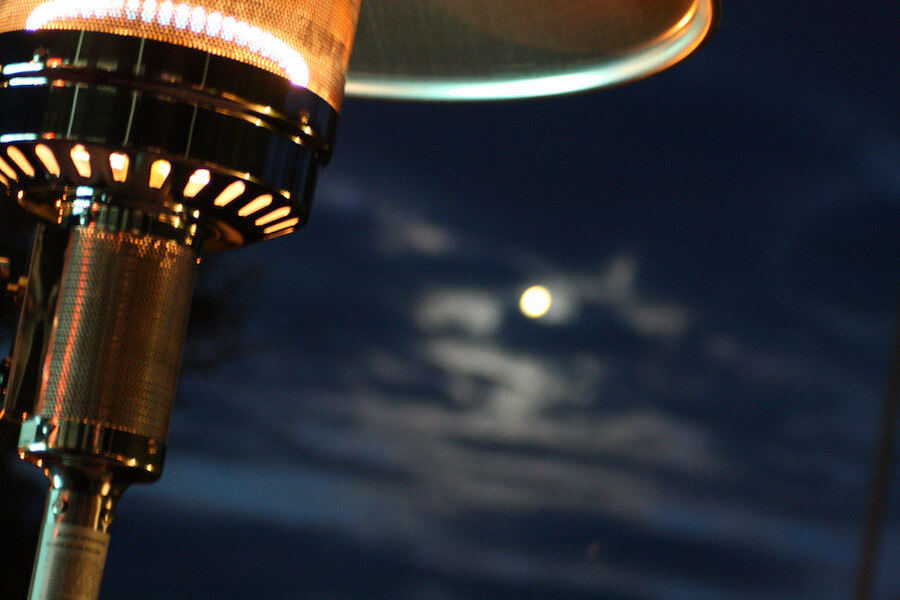Two similar patio heaters may work differently because of the gas. So what gas do you use for a patio heater? Which is the best and safest option?
In this post, we will discuss the two most common types of gas to use in a heater. Let’s see what they are and how they work!
Table of Contents
What Gas Do You Use For A Patio Heater?
People often use butane or propane for their patio heaters. These sources are different in many factors, making your decision trickier.
Propane and butane are types of LPG (Liquefied Petroleum Gas). Various processes extract them from natural gas. When burnt in a patio heater, they will emit carbon dioxide, carbon monoxide, soot, and water.
Here are some outstanding features of butane and propane. We will also give you a comparison table so that you can make up your mind easier.
Butane
Butane, a naturally combustible gas, is the product of processing natural gas and refining oil. Its boiling point is 0°C, the same range for water to freeze.
Due to the low boiling temperature, people don’t often use it for cold weather. When it’s below zero outside, butane storage will be challenging.
Butane is a common fuel for lighters, torches, and camping stoves. Because of its higher fuel efficiency, this form of LPG is a little cheaper than propane.
Propane
Propane has a much lower boiling point than butane, at a startling -45°C, making it easy to ignite.
Also, propane can tolerate low temperatures, so it is simpler to store. You can use it for numerous things, such as patio heaters, stoves, lanterns, and gas tanks.
Propane combines with other materials to form LPG. For example, some people add mercaptan to the gas to detect leaks because propane is odorless.
Meanwhile, the mercaptan is easily recognizable with its strong smell.
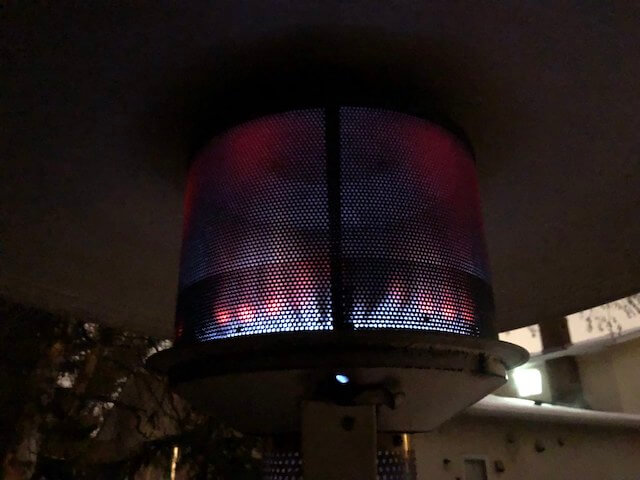
Comparison table
So, what should you use for your patio heater, butane or propane?
This comparison table will highlight the differences between the two LBGs. Please check it before we dig deeper into each difference.
| Butane | Propane | |
| Boiling temperature | 0°C | -45°C |
| Smell | Odorless but may taint food | Odorless |
| Pressure | Low | High |
| Environmental impact | Cleaner | More carbon monoxide and soot |
| Storage | Short term | Long term |
| Regulator size | 20mm and 21mm | 27mm |
| Cost | Cheaper | More expensive |
| Best for | Gas barbecues and patio heaters | Gas barbecues and patio heaters |
| Best time to use | Summer | Summer and winter |
Boiling temperature
The most significant difference between the gasses is the temperature at which butane and propane vaporize, or change from a liquid into gas to flow to your device.
The boiling point is the temperature at which a liquid begins to vaporize under compression. The bottle or cylinder stores the gas as a liquid first and pressurizes it.
The gas becomes a vapor when it hits the boiling point. Propane continues to vaporize up until a temperature of about -45°C.
Meanwhile, butane won’t vaporize until it reaches a temperature of at least 0°C.
As a result, it would be best to use propane to power your patio heater and BBQ during the winter. These outdoor appliances will function flawlessly to a temperature of roughly -45°C.
The heater may be difficult to light if you give it butane when it is 0 degrees outside since the gas can’t flow.
Smell
Although propane and butane are naturally odorless, some manufacturers add extra substances that smell. These additions serve as a warning of a gas leak.
Some claim that utilizing butane gas may mildly taint food. This problem occurs because a malfunctioning burner causes improper fuel burning. It may also be due to the butane torch you often use to sear meat.
Pressure
The cylinder uses less pressure to store butane. Hence, indoor appliances should go for butane instead of propane to be safe.
Environmental impact
Emissions result from burning any fuel, so both butane and propane emit emissions. Yet, butane burns cleaner than propane because it emits less carbon monoxide and soot during combustion.
Moreover, butane is a better choice for burning indoors. If you only have propane, ensure adequate ventilation in the room.
Regulator size
The standard regulator size for butane is 20mm or 21mm, making it suitable for small heaters. On the other hand, propane requires a larger regulator, 27mm.
Cost
Propane is slightly more expensive than butane. Yet, this minor gap shouldn’t affect your final choice.
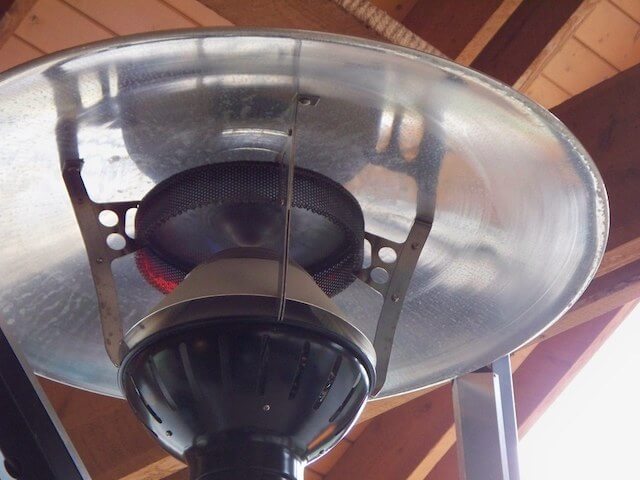
How Do Patio Heaters Work?
Although patio heaters may have a sophisticated, space-age appearance, their operation is straightforward.
Most patio heaters run on LPG cylinders of butane or propane. A hose allows the gas pumped from the cylinder to run across the heater. Once the gas gets to the burner, it ignites and generates a flame.
The gas regulator is in charge of attaching the hose to the cylinder, helping the gas dispense efficiently and safely. The regulator can also control the pressure the cylinder uses to release gas.
There are many types of regulators. You need to choose the correct one to fit your gas cylinder. Since butane and propane need releasing under different degrees of pressure, you can’t use their regulators interchangeably.
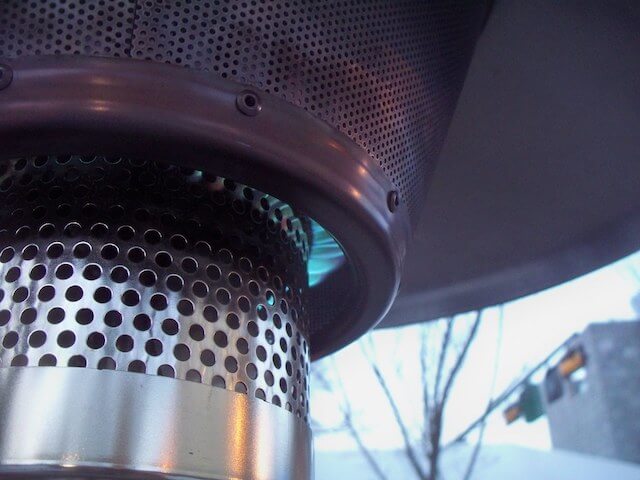
How To Tell When The Gas Bottle Is Empty?
Nothing is more aggravating than trying to switch on your patio heater only to realize that you have run out of gas. Yet, there is a quick way to figure it out.
Pour hot water (not boiling) into a bucket and pour it gently over the side of the gas bottle. The more water you pour, the easier it is to estimate how much gas is left in the bottle.
After a while, run your hands over the side of the gas bottle where you poured the water. You are looking for a temperature change.
The cold section of the gas bottle is how much gas it still has. If there isn’t any temperature change, the bottle is empty.
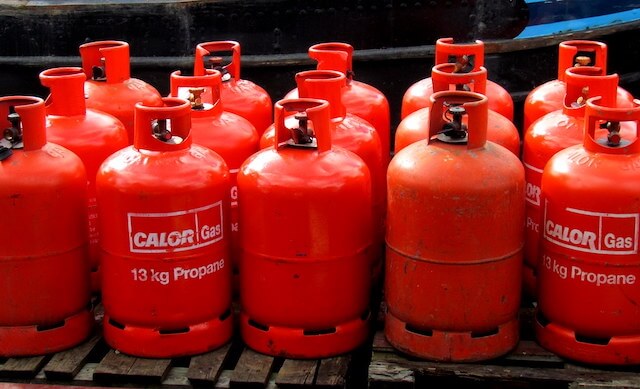
Electric Vs. Gas Patio Heaters
If you don’t like to use gas inside or around your house, electric patio heaters will be what you need. However, they have both benefits and drawbacks.
Let’s check what electric and gas patio heaters offer you.
Electric patio heaters
Electric heaters are excellent for spaces that lack adequate ventilation. They don’t release carbon monoxide and carbon dioxide in the air, posing no harm to the environment.
These units are simple to use. You can plug them anywhere convenient using a home outlet and let them burn.
Pros:
- Easy to use
- No harmful emission
- Odorless
Cons:
- No natural flame effect
- Only active with an outlet
Gas patio heaters
Gas heaters can warm a well-ventilated area nicely. Because of their flame effect, they run quietly and give off a cozy feeling.
Most outdoor spaces that are open and well-ventilated are ideal for placing gas heaters because they don’t need an electrical outlet to operate.
Pros:
- Affordable
- No need for outlets
- More heat output
- Natural warming effect
Cons:
- Harmful emissions
- Hard to install
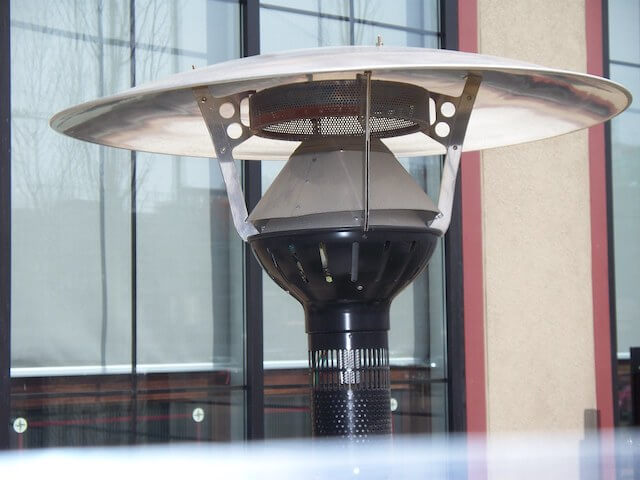
Frequently Asked Questions
1. Do patio heaters use a lot of gas?
No. When operated at its highest setting, a standard 13kW gas heater burns at a rate of 1230g/h. It implies that a 13 kg cylinder will provide around ten hours of use, or substantially longer if you set the heater to a lower temperature.
2. Which is cheaper to run a gas or electric patio heater?
Typically, gas patio heaters are less expensive to purchase than electric models, and gas is also cheaper than electricity.
However, a gas heater may cost you more because of its low efficiency, especially the outdoor units. They will waste a lot of heat by warming the area around them, rapidly dissipating.
Unlike electric patio heaters, they do not only heat their air through radiation.
3. What gas is used in portable heaters?
Portable heaters often run on LPG, kerosene, or diesel. They have different traits but are the best choices for lightweight heaters.
4. Is patio gas the same as propane gas?
Yes. Propane gas is a type of patio gas, which comes in green bottles. You can also choose butane as the patio gas for your heater.
5. What gas is best for a patio heater?
Propane and butane gasses have pros and cons, but propane is a better choice due to its lower boiling point.
Conclusion
Propane and butane gasses can fuel your patio heaters. Although propane emits more carbon monoxide and is costly, the lower boiling point makes it a superior choice. You can use it for both summer and winter, while butane only works well in the summer.
Hopefully, we have satisfactorily answered your question. Thank you for reading!

